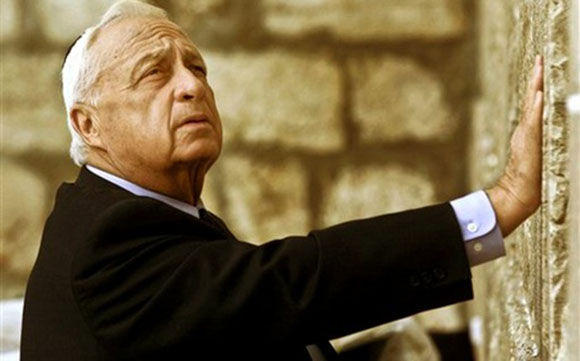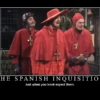The full extent of Western political leaders’ submission to the international Zionist Supremacist conspiracy has been dramatically demonstrated once again with the outpouring of “tributes” by all major “leaders” to the recently deceased former Israeli Prime Minister Ariel Sharon.

Only one major non-Jewish Supremacist controlled news source—Aljazeera—dared to point out that Sharon had died without facing justice for the massacre at Sabra and Shatila in 1982.
Sabra and Shatilla were two Palestinian refugee camps in Beirut, Lebanon where over two thousand Palestinians were massacred during three days in September 1982 by hundreds of Lebanese Phalange and Haddad militiamen with the aid and support of the Israeli Defense Forces—which were under the direct control of Arial Sharon, the mastermind of the Lebanon invasion of that year.
On June 18, 2001, several victims and other relatives sued Ariel Sharon for war crimes in a Belgium Court. But, under pressure from U.S. and Israeli governments, Belgium dropped the case as inadmissible.
Sharon also created Israel’s settlement movement—the same one which today carries on in his name, stealing Palestinian land while pretending to the world that Israel “seeks peace.” He once urged Israeli settlers in the West Bank to “grab more hills, expand the territory. Everything that’s grabbed will be in our hands, everything that we don’t grab will be in [Palestinian] hands.”
Despite all these crimes, Western “leaders,” including David Cameron, Angela Merkel, Barack Obama and others, have paid tribute to Sharon, heaping praise upon the Zionist Supremacist who ruled over a country which actively racially discriminates against non-Jews.
Aljazeera, however, carried an opinion piece by Yousef Munayyer, Executive Director of The Jerusalem Fund and its educational programme, The Palestine Center.
According to this review, “Sharon’s legacy is one of wanton destruction not just of Palestinian homes and lives, but of the peace process itself.
“Sharon, who died on January 11, had been involved in Israel’s war machine as early as 1948.
“Perhaps the earliest instance in this trend was the events of Qibya in 1953. Qibya is a Palestinian village in the West Bank, located close to the Green Line. In an Israeli attack on the village, led on the ground by Sharon, scores of homes were destroyed while civilians were still inside. The outcome was a massacre that left 69 Palestinians dead, most of whom were women and children.
“The massacre at Qibya only foreshadowed what was yet to come at the hands of Sharon.
“Sharon’s wanton disregard for civilian life was most pronounced in 1982 during the massacres at the Palestinian refugee camps of Sabra and Shatila in Lebanon.
“Israel, which had invaded and occupied southern Lebanon at the time, effectively controlled the area. In the camps, Israeli-allied Lebanese Phalangists entered and committed large-scale killings of the Palestinian civilian population, while Israeli forces guarded the perimeter.
“Sharon, who was then minister of defence, was once again at the centre of a massacre of Palestinians. An Israeli commission, led by the president of the Israeli Supreme Court, Yitzhak Kahan, found that Israeli forces were indirectly responsible for the massacre, and that Sharon himself bore personal responsibility – as he knew full well what would happen when the decision was made to permit the Phalangists to enter into the camp.
“Among the recommendations of the Kahan commission report, which was accepted by the Israeli cabinet, was that Sharon should be removed from office and to never again hold a ministerial position.
“The Israeli prime minister at the time, Menachem Begin, refused to dismiss Sharon, and Sharon refused to resign. After continued outrage, Sharon left the defence ministry but remained in the cabinet as a minister without portfolio.
“Sharon escaped accountability in Qibya and, despite heavy criticisms of his role in the Sabra and Shatila massacres, Sharon’s career in public life did not end.
“While he took a back seat for several years when the Likud party was led by Begin, Yitzhak Shamir and later Benjamin Netanyahu, Sharon eventually returned to the forefront of Israeli political life and campaigned for the premiership in 2000. During his campaign, then Israeli Prime Minister Ehud Barak was engaged in negotiations with Yasser Arafat, chairman of the PLO – talks mediated by US President Bill Clinton.
“In a stunt aimed at attacking Barak for what Israelis on the right considered to be the blasphemous act of negotiating with Palestinians, Sharon made a very provocative visit to the Haram al-Sharif – Temple Mount – in Jerusalem, with a massive armed guard on September 29, 2000.
“The act, aimed at inflaming tensions and attacking his opponent Barak who was engaged in the ‘peace process’, drew anger from Palestinians and Muslims around the world and triggered uprisings that would eventually become the second Palestinian intifada.
“Palestinians living inside Israel joined in protest against Sharon’s visit and Israel’s occupation and claims over Palestinian land. They were quickly and brutally repressed by Israeli police, often with the use of live ammunition aimed at protesting crowds, which left 13 Palestinians dead and 1,000 hospitalised.
“Sharon had managed to pour fuel on the burning embers of occupation and discrimination on both sides of the Green Line.
“His premiership, much like his history before that, was characterised by destruction and violations of international law. He presided over the single most significant period of Israeli settlement expansion, illegal under international law, since the Begin era.
“In addition to the construction of Israeli settlements, he oversaw the wide-scale punitive destruction of Palestinian homes. It was under his tenure as prime minister that the policy of demolishing the homes of Palestinians involved in attacks against Israelis was established.
“This policy was decried by Human Rights Watch and Amnesty International as collective punishment: illegal under international law.
“Later in his premiership and shortly before suffering a stroke, Sharon took the decision to remove Israeli settlers from the Gaza Strip in a unilateral withdrawal. The removal of some 5,000 settlers living among 1.5 million Palestinians was simple mathematics for Sharon. The costs of protecting such a small number of settlers among so many Palestinians in such a small piece of territory far outweighed any benefits of being there.
“More often than not, in a life characterised by violence and slaughter, Sharon continued to find exactly what he was looking for – and it was anything but peace.”





